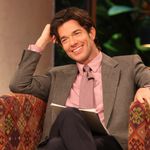
Ten years (ten years!) after Love Actually, writer-director Richard Curtis has returned with his newest romantic comedy, About Time. The film stars Domhnall Gleeson as Tim, a young man whose father (Bill Nighy) has just revealed that the men in their family can travel in time, an ability Tim uses to go back and improve his relationship with the love of his life, Mary (Rachel McAdams). Curtis chatted with Vulture about the new film, the Ben Folds song that was one of its influences, and why he’s always been “a fool for love.”
I just wanted to start by saying that I saw About Time last week and it was just the loveliest movie.
That’s so sweet of you! That’s a very good start. The conversation has gotten off to a very good start.
I’m a huge Ben Folds fan, so when “The Luckiest” began playing at the beginning of the movie, while the screen was still black, I thought, Okay, here we go.
[Laughs.] You know, when I handed in the movie, it said “About Time OR The Luckiest OR Gold in Them Hills.” They’re so, so influential that I almost thought of naming the movie after them.
Did About Time exist before you had heard the song or was it kind of a happy coincidence?
Well, I don’t know. Both those songs [“About Time” and “The Luckiest”] had been on my mind as meaning a lot to me for ages, and when I started to kind of deal with this issue of what constitutes how to be happy, you know, how to be happy with normality, they both leapt into my mind. They would have been the first songs on my About Time playlist.
Did you have any communications with Ben Folds? Was he involved in any way?
Not until the end. Not until we asked him and showed it to him to see whether or not he was happy. He was very nice. And he was giving a concert with Ben Folds Five, and I went to see him and asked him if it would be okay.
Was Bill’s involvement as crucial as “The Luckiest”? Because it seems like they’re both perfect matches. You can’t imagine this movie without Bill Nighy’s performance. He seems to embody that type of person who enjoys life almost in an otherworldly sense. Was he always the No. 1 pick?
No, the thing is, he wasn’t. Only a couple times in my career have I written parts for people. I try not to do that. But when it got around to casting it, I did sort of think of a way that Bill could do it. I asked if he could come in and chat about it, and, by a roundabout route, we both came to the same conclusion. He said, “I’d love to do the part as long as I don’t do any acting.” [Laughs.] And I said, “I assume that we don’t have to pay you.” What he meant was, he wanted to do as little as possible so that it would, in a way, leave a space for everyone to imagine their father into the role. And I think I’d always wanted it to be a very modest performance, because I think there was a way of that going very wrong, you know? Him being a mustache-twirling English eccentric who locks his son in his study and tells him the great mystery. I always wanted it to be the most gentle thing. So, in the end, having an actual friend who likes the texture of my work, and would be very gentle and sweet with the younger actor — those things were very crucial to the movie working out.
It’s been ten years since Love Actually. I read that you waited a while to write About Time. Why is that?
I had a choice. I went away in 2005, six months with my family, and I was writing during that time and trying to work out what I wanted to write. And I had a list of a few films I wanted to write, and I decided that since this one seemed to me to be the, sort of, wisest? The one that was going to be most based on life experience. I thought, Well, I’ll leave that the longest. And so I did my sort of cheerful movie about pirate radio [Pirate Radio], and my didactic movie about malaria [Mary and Martha], and then I got around to doing this one.
Do you approach writing romantic comedies differently from, let’s say, Pirate Radio or the malaria film?
You know, no. I hope not. I’ve never read a book about screenwriting. I don’t know if it’s meant to be one act or three or five. And I didn’t know when I wrote Four Weddings that it was a romantic comedy. I thought it was a semi-autobiographical film about love causing problems. And I was thinking about Breaking Away and Gregory’s Girl and Annie Hall and Diner and films like that. I haven’t studied the genre. And I think that would be a bad way of making decisions about the content of a movie. To say, “What normally happens is this.” So I would approach everything in the same way. Which is, try and find the story you want to tell and try and find your own way of telling that particular story.
Do you watch many romantic comedies on your own time? Is this a genre that you are invested in outside of your own work?
Well, I don’t know. You see, if I had to pick my favorite films of this century, as it were, some lovely and, in some cases, funny films about love would be in the top ten: (500) Days of Summer, I adore and have watched more than once; there’s a movie Drake Doremus made called Like Crazy that I loved; I’ve seen Lost in Translation more than once; I loved Eternal Sunshine of the Spotless Mind. These are the films that I think about when I think about romantic films. People who are really interested in love and making the best film they can. So, in a way, I hope that I’m at least on that side of the line, rather than on the, perhaps, more generic side of the line.
Yeah, so many of those romantic comedies have been kind of major profile flops over the past couple years. The ones that are successful, like (500) Days of Summer and Silver Linings Playbook last year, people would be more hesitant to call those romantic comedies than, what did you say? Funny films about love? Do you think it’s difficult to get romantic comedies made anymore?
I don’t know. I really don’t know the answer to that. I mean, I think that, just like in all fields, you’ve got to try and find people who really care about the issue. I’ve been thinking about so much because I had to deliver a lecture on screenwriting and realized that I’d never really thought about the subject before. I suddenly thought, Why have I written all these films about this subject? And it turns out, really, autobiographically speaking, I was always a fool for love. You know, I first fell in love when I was 4. And then when I was 7. And then with Julie Andrews. And so, you know, when I had my heart broken, I had to leave university because I couldn’t cope, so I think I write about the subject because that’s the subject that most messed around with and made excellent my life. And I guess, on the whole, I would say that people should make films about things that they really really care about.
Going back to Love Actually for a second: When you were writing that, was it always this enormous story with all these interconnected love stories, or was it a lot of disconnected stories to begin with?
Well, that was a long genesis. After Notting Hill, I took my time, and I thought that I might write the film that turned out being Hugh’s story [in Love Actually] and the film that turned out being Colin’s story [in Love Actually] as whole films. I’d worked out whole films on those subjects, and then I thought, Oh, I don’t want to do these because they are just turning out to be a shape I know. And I said, “I’d be more interested in writing a film about love and what love sort of means, and how, you know, about the subject than rather than one example of a story about that subject.” And then I remembered how much I loved Robert Altman’s movies with lots of stories — Nashville and Short Cuts. And how much I loved those Woody Allen movies with three or four stories. And Pulp Fiction. And Smoke. And I suddenly thought, Oh, I’ll write one of those. And then if I write one of those, I can not only deal with the Jolly-People-Fall-in-Love-and-Kiss ones, but I can also deal with the Emma Thompson story and the Laura Linney story and the father and son story and stuff. So, you know, I found something I wanted to do rather than write something I thought I ought to write.
The film’s closing montage around London kind of mirrors what you did in Love Actually: final montages of real people experiencing love and life in their own way. Is that something you wanted to do?
Yeah. You have things which obviously appeal to you. And with Love Actually, that [ending] was really important to me. I remember noticing at an airport, it was actually while we were shooting the Mr. Bean film and I was stuck airside, and I suddenly saw all this extraordinary emotion. And I thought, That is the proof that there is so much overflowing love in the world and it’s absolutely core to people’s lives. And that was real documentary footage that we shot without anyone knowing we were shooting, and we had to rush up to people and ask for their permission to use it. But, in this movie, I always knew from the beginning that the movie was gonna end with a really ordinary day featuring the Domhnall character. And then when I finished, I thought it would be nice to include just a moment of the other characters. And then once I decided to do that, I thought it would be nice to just thread in some [random] people, so the movie is kind of handed back to the audience. So I suppose it’s just a flavor I like at the end of the film … just a bit of evidence that [the movie] wasn’t only about that one family in Cornwall, but that it was also about an old couple holding hands in the street. And a little girl dancing. And the film has a sort of message, which is, I hope everyone who walks out of the cinema will call their dads and try to have a happier day tomorrow.




